Spring: n/a
Summer: n/a
Part-time (Daytime)
Overview
Our Master of Science in Mathematics provides you with basic graduate training in mathematics. As a math graduate student, you will choose from a widely ranging program of study that may focus on pure or applied mathematics. The program's flexible coursework is designed to prepare you for employment in areas such as academia, government, business or industry or for further graduate study. You will work with your graduate advisor to design a program of study geared towards your interests and goals.
Program Outcomes
Upon graduation, you will have achieved a mastery of fundamental knowledge in a broad range of mathematical areas as well as a deeper understanding of at least one particular sub-field of mathematics and/or related field. You will hone your ability to solve problems and communicate solutions and concepts clearly and in rigorous mathematical language. Those of you who choose the "Thesis Option" will also be able to demonstrate an ability to present and defend research work in oral, written, and graphic forms.
Graduates of the MS Program have gone on to employment in areas such as academia, government, business or industry or have gone on to be accepted at competitive PhD programs.
Application Requirements
- Application fee
- Resume/CV
- Personal Statement (750 words or fewer): This statement should include your reasons for wanting to pursue graduate study at Tufts and within the Department of Mathematics. Discuss what makes mathematics exciting to you. In addition, please include a description of a math problem or topic that challenged you early in your undergraduate experience. Discuss how you, perhaps with the help of others, overcame those difficulties to understand the problem better and how you presently understand it. Do not be afraid to choose something from a "basic" class like calculus. Your application materials already speak to your achievements; here instead we are interested in hearing about how you have developed your interest in mathematics. Please limit your statement to 750 words or fewer.
- Official TOEFL or IELTS, if applicable
- Transcripts
- Three letters of recommendation
Tuition & Fees
GSAS bills tuition using a per-credit billing model, meaning you are billed for the number of credits you take each semester. This billing model is used to provide students better flexibility so they may "pay-as-they-go".
| Tuition* | $1,594 per credit |
| Total Credits Required | 30 |
| Enrollment Status | Part-Time: 3-6 credits (typically 1-2 courses) Full-Time: 9+ credits (typically 3 or more courses) or qualifying enrollment criteria (assistantships, internships, or continuation courses, etc.) |
Estimating Tuition Costs for this Program
This example pathway outlines estimated tuition costs per semester using a typical full-time course load. This is one possible pathway to completion; actual credits, costs, enrollment status, and degree completion time may vary based on a student’s course load.
| Full-Time Pathway | Fall | Spring | Total |
| Year 1 | 9 credits | 8 credits | 17 credits |
| $14,346 | $12,752 | $27,098 | |
| Year 2 | 6 credits | 7 credits | 13 credits |
| $9,564 | $11,158 | $20,722 | |
| Estimated Total Tuition Before Aid* | $47,820* | ||
Note: this example does not account for any scholarships that may be awarded at the time of admission. GSAS offers generous merit- and need-based tuition scholarships for qualified applicants. A list of funding opportunities is provided below.
*Estimated based on 2025-2026 tuition rates. Rates are subject to change each academic year. For further information about the full cost of attendance, including health insurance, fees, and estimated indirect costs (housing, transportation, etc.), visit Student Financial Services.
Financial Aid & Funding Opportunities
At Tufts University, we believe that every qualified applicant should have the opportunity to pursue graduate study, regardless of financial circumstances. We are committed to helping you navigate the financial aspects of your education and strive to make graduate school accessible through a variety of support options.
Scholarships and Awards Available for this Program
- Merit- and need-based tuition scholarships for master’s programs: To be considered, be sure to indicate your interest within the Financial Aid section of your application.
- The Future Leaders Fellowship is a full-tuition scholarship for outstanding full-time master’s students and entry-level OTD students. Future Leaders Fellows are selected by the GSAS Dean following their admittance to Tufts.
- Fifth Year Master's Degree Program — current Tufts Undergraduates can enroll in this program which has reduced tuition costs and provides a Financial Aid Match with a graduate tuition scholarship proportional to the undergraduate tuition award at the time of application.
- City Year Corps members, alumni, and staff are eligible to receive a minimum scholarship award of 25% off tuition.
Work Opportunities and Awards
- There are various graduate assistantships and work opportunities available for Master’s students across Tufts.
- The Graduate Student Open Access Publishing Fund provides financial support to students who want to publish their work open access.
- The Graduate Student Research Competition provides funding for expenses including equipment, materials, and supplies; research participant compensation; and expenses of travel to conduct research.
- The Graduate Student Conference Reimbursement Fund is available for students to travel to present or attend at a conference or professional meeting.
Visit our Graduate Financial Aid page for information on loans and financing options.
Career Outcomes
Average Salary: $99K - $159K
Would Recommend the Program: 100%*
Overall Satisfaction with Tufts Grad Program: 100%
*Sources: GSAS-SOE Graduate Exit Survey 2020 - 2021 and Academic Analytics (Alumni Insights)
Faculty

Kasso Okoudjou

Kasso Okoudjou
Research/Areas of Interest: Time-frequency analysis, pure, applied, and numerical harmonic analysis; analysis and differential equations on fractals and graphs.
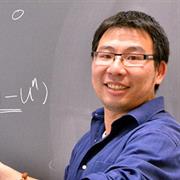
Xiaozhe Hu

Research/Areas of Interest: Scientific computing and numerical analysis; Parallel multigrid and multilevel methods for large-scale coupled systems; Efficient numerical methods for reservoir simulation, fluid-structure interaction, and other applications.
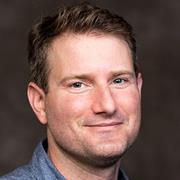
James Adler

James Adler
Research/Areas of Interest: Scientific computing and numerical analysis: Efficient computational methods for complex fluids, plasma physics, electromagnetism and other physical applications.

Bruce Boghosian

Bruce Boghosian
Research/Areas of Interest: Applied dynamical systems, applied probability theory, kinetic theory, agent-based modeling, mathematical models of the economy, theoretical and computational fluid dynamics, complex systems science, quantum computation Current research emphasis is on mathematical models of economics in general, and agent-based models of wealth distributions in particular. The group's work has shed new light on the tendency of wealth to concentrate, and has discovered new results for upward mobility, wealth autocorrelation, and the flux of agents and wealth. The group's mathematical description of the phenomenon of oligarchy has also shed new light on functional analysis in general and distribution theory in particular. Secondary projects include new directions in lattice Boltzmann and lattice-gas models of fluid dynamics, kinetic theory, and quantum computation.
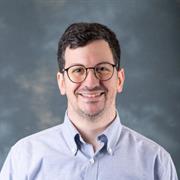
Corey Bregman

Corey Bregman
Research/Areas of Interest: Geometric group theory, low-dimensional topology, CAT(0) spaces

Fulton Gonzalez

Fulton Gonzalez
Research/Areas of Interest: Noncommutative harmonic analysis, representations of Lie groups, integral geometry, and Radon transforms

Boris Hasselblatt

Boris Hasselblatt
Research/Areas of Interest: Geometrically motivated hyperbolic dynamics — Hasselblatt's research, undertaken with colleagues from several continents, is in the modern theory of dynamical systems, with an emphasis on hyperbolic phenomena and on geometrically motivated systems. He also writes expository and biographical articles, writes and edits books, and organizes conferences and schools. His publication profile can be viewed at https://mathscinet.ams.org/mathscinet/author?authorId=270790 (with a subscription). Former doctoral students of his can be found in academic positions at Northwestern University, George Mason University, the University of New Hampshire, and Queen's University as well as among the winners of the New Horizons in Mathematics Prize.

Misha Kilmer

Misha Kilmer
Research/Areas of Interest: Numerical Linear and Multilinear Algebra, Scientific Computing, Image Reconstruction and Restoration

George McNinch

George McNinch
Research/Areas of Interest: The structure and representations of algebraic groups

James Murphy

James Murphy
Research/Areas of Interest: Machine learning, harmonic analysis, statistical learning, graph theory, data science, computational mathematics, image processing, signal processing
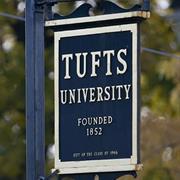
Elizabeth Newman

Elizabeth Newman
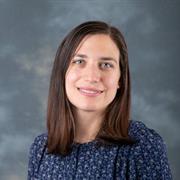
Samantha Petti

Samantha Petti
Research/Areas of Interest: computational biology, algorithms, probability, fitness landscapes, evolution, protein structure, statistical inference

David Smyth

David Smyth
Research/Areas of Interest: Algebraic Geometry
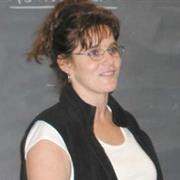
Kim Ruane

Kim Ruane
Research/Areas of Interest: Geometric Group Theory/Topology

Abiy Tasissa

Abiy Tasissa
Research/Areas of Interest: Matrix completion, compressive sensing, distance geometry

Montserrat Teixidor I Bigas

Montserrat Teixidor I Bigas
Research/Areas of Interest: To each point on a curve, one can often associate in a natural way a line or plane (or higher dimensional linear variety) that moves with the point in the curve. This set of linear spaces is called a vector bundle. Vector bundles appear in a variety of questions in Physics (like the computation of Gromov-Witten invariants) . Moreover, they provide new insights into old mathematical problems and have been used to give beautiful proofs to long standing conjectures as well as striking counterexamples to some others.
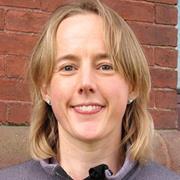
Genevieve Walsh

Genevieve Walsh
Research/Areas of Interest: Hyperbolic manifolds and orbifolds, low-dimensional topology, group actions